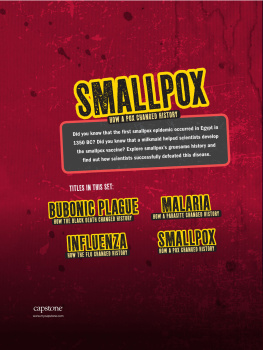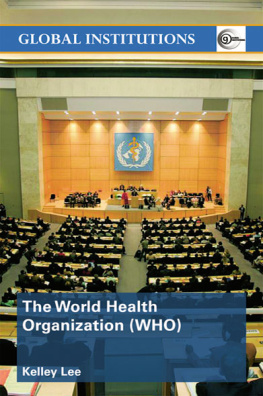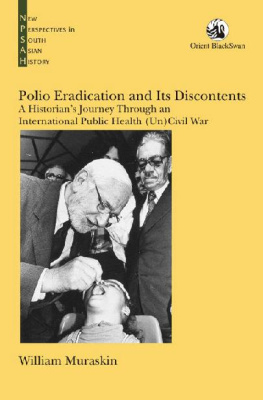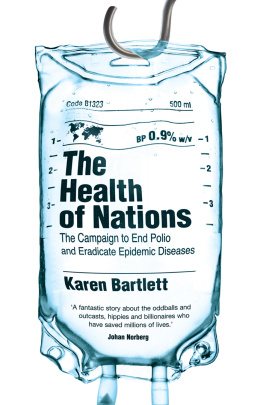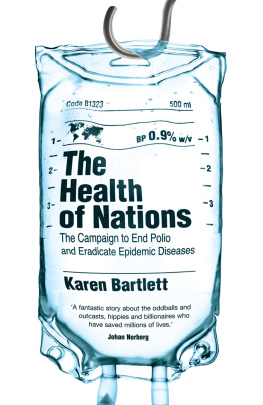Eradication
Ridding the World of Diseases Forever?
Nancy Leys Stepan
REAKTION BOOKS
This book is dedicated to my grandchildren, Isabel, Colin, Helena, Esther,
Heloisa, Fiona and Erica
Published by Reaktion Books Ltd
33 Great Sutton Street
London EC1V 0DX
UK
www.reaktionbooks.co.uk
First published 2011
Copyright Nancy Leys Stepan 2011
All rights reserved
No part of this publication may be reproduced, stored in a retrieval
system, or transmitted, in any form or by any means, electronic,
mechanical, photocopying, recording or otherwise, without the prior
permission of the publishers.
Page references in the Photo Acknowledgements and Index match
the printed edition of this book.
Printed and bound in Great Britain
by MPG Books Group
British Library Cataloguing in Publication Data
Stepan, Nancy.
Eradication: ridding the world of diseases forever?
1. Communicable diseases Prevention History.
2. Epidemics Prevention History.
3. Medicine, Preventive History.
4. Health promotion History.
5. Soper, Fred Lowe, 18931977.
I. Title
616.9045-dc22
eISBN 978 1 86189 967 5
Contents

The purpose of this book is to examine the origins, historical development, impact and controversies surrounding disease eradication as a goal in international public health.
We often use the term eradication in a loose way, as when, for example, we talk about eradicating poverty, when what we really mean is that we hope to greatly reduce poverty in the world. In this book, however, I am using the term in its more precise, modern, public health sense to mean the reduction of the worldwide incidence of a disease to zero as a result of deliberate efforts. Eradication is distinguished from disease control, which refers simply to the reduction of disease incidence to an acceptable level, without the expectation that we are ridding the world of the disease forever. In eradication, the emphasis is instead on zero disease and purposeful public health intervention. Eradication also sets a deliberate start- and end-date to the project (usually a span of ten to twenty years). Finally, eradication makes an argument about costs; it is argued that although eradication is expensive to carry out, it is cheaper in the long run than disease control because, once the goal of zero disease incidence is achieved, the continued costs of maintaining control measures can be given up forever, without the risk of the disease coming back.
Eradication, in short, stands for an absolute.
Eradication is a modern concept and a modern achievement. Although many diseases (and biological species) have become extinct over the course of human history without deliberate campaigns being waged against them (because of changed environmental conditions or unknown mutations in the genetic makeup of biological organisms), the deliberately aimed-for, complete elimination of a disease is very recent, a product of the twentieth century. The eradication concept was pioneered by the Rockefeller Foundation in campaigns against hookworm disease, yellow fever and malaria before the Second World War. After the war eradication was endorsed by the newly founded World Health Organization (WHO), with eradication campaigns being launched against yaws, yellow fever, malaria and smallpox and, more recently, against poliomyelitis and Guinea Worm Disease (dracunculiasis). These campaigns are among the largest, most logistically complex, and costly initiatives ever undertaken in international public health. They involve the participation and support of numerous national governments, working across the political spectrum, with a degree of cooperation rare in the international arena. They also absorb the resources political, financial, technical and human of the most significant international health organizations, such as UNICEF and the WHO, as well as of the major philanthropic organizations of the times, from the Rockefeller Foundation in the pre-Second World War era, to the Bill and Melinda Gates Foundation today. Indeed, eradication campaigns must be counted as some of the most ambitious programmes in international public health history.
The trouble is that, thus far, only one of the eradication campaigns has met its absolutist goal smallpox.
Perhaps no single disease has killed or disfigured more people in human history than smallpox. The hideous smallpox blisters that covered infected peoples faces and bodies are unforgettable to those who saw them before smallpox was finally eliminated. Many people were left not just severely pockmarked, but also blind as a result of the infection. In some populations, up to 70 per cent of those infected died of the disease. The WHO first endorsed eradication in 1958; an intensified programme, starting in 1967, halted transmission ten years later, the last case of naturally occurring smallpox being identified in a Somali man in October 1977. The official announcement that smallpox had truly gone was made in Geneva in 1980 the first time in human history that a disease had been eliminated throughout the entire world as a result of deliberate human effort. It was a great achievement. As a consequence, routine smallpox vaccinations were eventually stopped (the US had given them up as early as 1972).
This proof in 1980 that eradication was actually feasible came at a critical moment when enthusiasm for eradication had waned in the face of several setbacks and failures. As a result of the smallpox success, two new global eradication campaigns were launched in the 1980s and 90s, along with several regional eradication efforts. Several other diseases (for example, measles) wait in the wings as potential candidates for future eradication efforts.
It is against the background of the disappearance of smallpox as a human affliction, and the renewed enthusiasm for disease eradication campaigns internationally, that we need to assess the impact of the attacks of 11 September 2001 in the United States, and then the events that followed shortly afterwards, when the deliberate spread of spores of the deadly disease anthrax by an unknown person or persons caused five deaths, paralysed for weeks the functioning of fundamental institutions of the federal government, like the post office, and for a while terrified the population.
The dramatic story of smallpox eradication underlines the continued relevance, but also the problematic status, of eradication as a public health philosophy and goal. On the one hand, who could deny that the complete eradication of a disease is a positive achievement? On the other hand, who can deny that complete eradication thus far is very rare, and that there may be unforeseen consequences to eradication, such as the lack of defence against rogue infections?
Looking at eradication from a larger, less immediate perspective, many public health experts have asked whether the pursuit of the eradication of specific human diseases, one by one, is the best way to improve health in the international arena. Is eradication worth the intense effort it takes to achieve? Is complete eradication the best way to achieve human health, especially in poor countries where most eradication campaigns are carried out? What are the costs as well as the benefits of eradication? Are there alternative and more effective approaches to disease that are overlooked or marginalized by the intense concentration on eradication? Is the concept of the complete extinction of a biological agent or a disease in some kind of tension or even in contradiction with modern environmentalism and ecology? Has eradication become eradicationism, a faith, or a utopian dream, rather than a practical solution to ill health in human populations?



